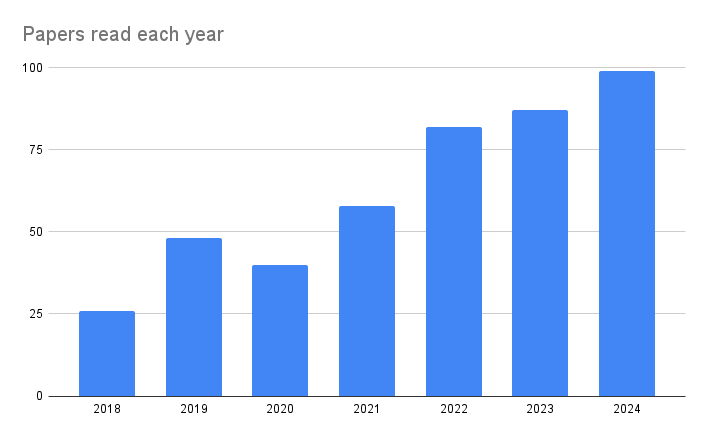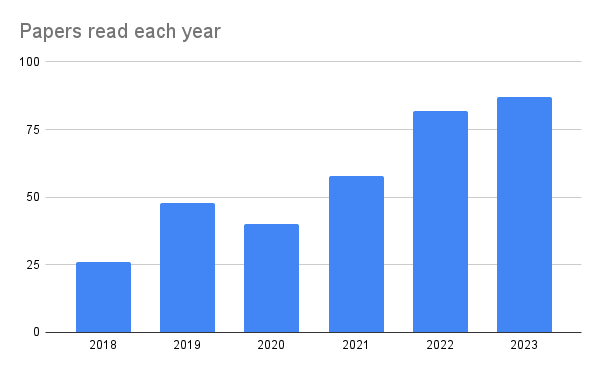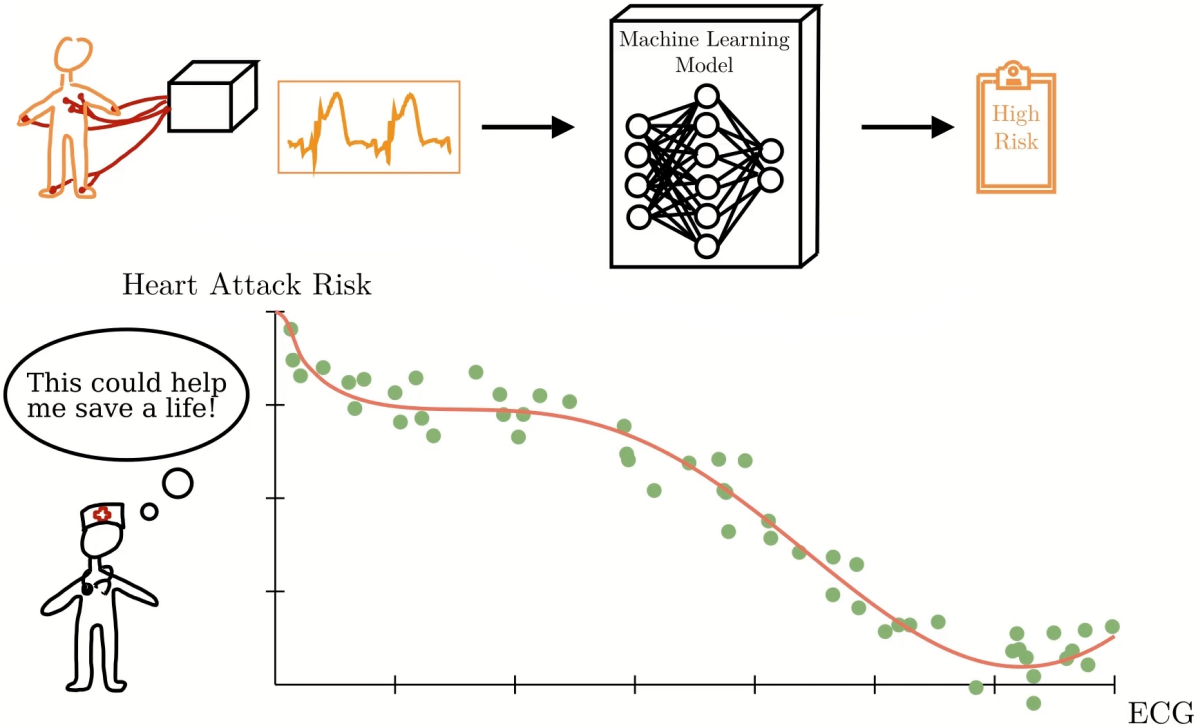In 2025, I read 113 papers and 16 non-technical books. 113 papers is slightly more than my previous record (99 papers in 2024). In 2026, I want to read…
I am a postdoc in the group of David Clifton at the University of Oxford, working on machine learning for healthcare with a particular focus on biosignals and wearables. More broadly, I am interested in how to build and evaluate reliable machine learning models, for applications within data-driven medicine and healthcare. My research has often included regression problems, uncertainty estimation methods, energy-based models, diffusion models, or the evaluation of foundation models.
Before moving to Oxford, I was a postdoc in the group of Mattias Rantalainen at Karolinska Institutet from 2023 to 2025, working on computational pathology. I received my BSc in Applied Physics and Electrical Engineering in 2016 and my MSc in Electrical Engineering in 2018, both from Linköping University. During my MSc, I also spent one year as an exchange student at Stanford University. I received my PhD in Machine Learning in 2023 from Uppsala University for the thesis Towards Accurate and Reliable Deep Regression Models. During my PhD, I was supervised by Thomas Schön and Martin Danelljan. I am originally from Trollhättan, Sweden.
[Jan 18, 2026] New blog post: My Year of Reading in 2025.
[Jan 8, 2026] New preprint: Scanner-Induced Domain Shifts Undermine the Robustness of Pathology Foundation Models [arXiv] [project], work led together with Erik Thiringer.
[Jul 15, 2025] I have joined the group of David Clifton at the University of Oxford as a postdoc to work on machine learning for healthcare.
[Jun 19, 2025] Accepted paper: Taming Diffusion Models for Image Restoration: A Review, work led by Ziwei Luo, has been published in Philosophical Transactions of the Royal Society A.
[May 22, 2025] New preprint: Forward-only Diffusion Probabilistic Models [arXiv] [project], work led by Ziwei Luo.
[Mar 6, 2025] Accepted paper: Automated Segmentation of Synchrotron-Scanned Fossils, work led by Melanie During and Jordan Matelsky, has been published in Fossil Record.
[Jan 3, 2025] New blog post: My Year of Reading in 2024.
[Nov 18, 2024] New preprint: Multi-Stain Modelling of Histopathology Slides for Breast Cancer Prognosis Prediction [medRxiv] [project], work led by Abhinav Sharma.
Click here for older news.
[P5]
Scanner-Induced Domain Shifts Undermine the Robustness of Pathology Foundation Models
Erik Thiringer, Fredrik K. Gustafsson, Kajsa Ledesma Eriksson, Mattias Rantalainen
[P4]
Forward-only Diffusion Probabilistic Models
Ziwei Luo, Fredrik K. Gustafsson, Jens Sjölund, Thomas B. Schön
[P3]
Multi-Stain Modelling of Histopathology Slides for Breast Cancer Prognosis Prediction
Abhinav Sharma, Fredrik K. Gustafsson, Johan Hartman, Mattias Rantalainen
[P2]
Evaluating Computational Pathology Foundation Models for Prostate Cancer Grading under Distribution Shifts
Fredrik K. Gustafsson, Mattias Rantalainen
[P1]
Evaluating Deep Regression Models for WSI-Based Gene-Expression Prediction
Fredrik K. Gustafsson, Mattias Rantalainen
[J5]
Taming Diffusion Models for Image Restoration: A Review
Ziwei Luo, Fredrik K. Gustafsson, Zheng Zhao, Jens Sjölund, Thomas B. Schön
Philosophical Transactions of the Royal Society A, 2025
[J4]
Automated Segmentation of Synchrotron-Scanned Fossils
Melanie A.D. During, Jordan K. Matelsky, Fredrik K. Gustafsson, Dennis F.A.E. Voeten, Donglei Chen, Brock A. Wester, Konrad P. Körding, Per E. Ahlberg, Thomas B. Schön
Fossil Record, 2025
[J3]
Evaluating Regression and Probabilistic Methods for ECG-Based Electrolyte Prediction
Philipp Von Bachmann, Daniel Gedon, Fredrik K. Gustafsson, Antônio H. Ribeiro, Erik Lampa, Stefan Gustafsson, Johan Sundström, Thomas B. Schön
Scientific Reports, 2024
[J2]
How Reliable is Your Regression Model's Uncertainty Under Real-World Distribution Shifts?
Fredrik K. Gustafsson, Martin Danelljan, Thomas B. Schön
Transactions on Machine Learning Research (TMLR), 2023
[J1]
Uncertainty-Aware Body Composition Analysis with Deep Regression Ensembles on UK Biobank MRI
Taro Langner, Fredrik K. Gustafsson, Benny Avelin, Robin Strand, Håkan Ahlström, Joel Kullberg
Computerized Medical Imaging and Graphics, 2021
Cited by 20
[C6]
Controlling Vision-Language Models for Multi-Task Image Restoration
Ziwei Luo, Fredrik K. Gustafsson, Zheng Zhao, Jens Sjölund, Thomas B. Schön
ICLR, 2024
Cited by 235
[C5]
Image Restoration with Mean-Reverting Stochastic Differential Equations
Ziwei Luo, Fredrik K. Gustafsson, Zheng Zhao, Jens Sjölund, Thomas B. Schön
ICML, 2023
Cited by 325
[C4]
Learning Proposals for Practical Energy-Based Regression
Fredrik K. Gustafsson, Martin Danelljan, Thomas B. Schön
AISTATS, 2022
[C3]
Deep Energy-Based NARX Models
Johannes Hendriks, Fredrik K. Gustafsson, Antônio Ribeiro, Adrian Wills, Thomas B. Schön
SYSID, 2021
[C2]
How to Train Your Energy-Based Model for Regression
Fredrik K. Gustafsson, Martin Danelljan, Radu Timofte, Thomas B. Schön
BMVC, 2020
Cited by 45
[C1]
Energy-Based Models for Deep Probabilistic Regression
Fredrik K. Gustafsson, Martin Danelljan, Goutam Bhat, Thomas B. Schön
ECCV, 2020
Cited by 90
[W4]
Photo-Realistic Image Restoration in the Wild with Controlled Vision-Language Models
Ziwei Luo, Fredrik K. Gustafsson, Zheng Zhao, Jens Sjölund, Thomas B. Schön
CVPR Workshops, 2024
Cited by 25
[W3]
Refusion: Enabling Large-Size Realistic Image Restoration with Latent-Space Diffusion Models
Ziwei Luo, Fredrik K. Gustafsson, Zheng Zhao, Jens Sjölund, Thomas B. Schön
CVPR Workshops, 2023
Cited by 190
[W2]
Accurate 3D Object Detection using Energy-Based Models
Fredrik K. Gustafsson, Martin Danelljan, Thomas B. Schön
CVPR Workshops, 2021
[W1]
Evaluating Scalable Bayesian Deep Learning Methods for Robust Computer Vision
Fredrik K. Gustafsson, Martin Danelljan, Thomas B. Schön
CVPR Workshops, 2020
Cited by 430
[T2]
Towards Accurate and Reliable Deep Regression Models
Fredrik K. Gustafsson
PhD Thesis in Machine Learning, Uppsala University, 2023
[T1]
Automotive 3D Object Detection Without Target Domain Annotations
Fredrik K. Gustafsson, Erik Linder‑Norén
MSc Thesis in Electrical Engineering, Linköping University, 2018
122 papers in total.
How Reliable is Your Regression Model’s Uncertainty Under Real-World Distribution Shifts?
RISE Learning Machines Seminars | Online | [slides] [video]
March 21, 2024
How Reliable is Your Regression Model’s Uncertainty Under Real-World Distribution Shifts?
DFKI Augmented Vision Workshop | Online | [slides]
October 31, 2023
Accurate 3D Object Detection using Energy-Based Models
Zenseact | Online | [slides]
January 29, 2021
Evaluating Scalable Bayesian Deep Learning Methods for Robust Computer Vision
Zenuity | Gothenburg, Sweden | [slides]
June 18, 2019
Building and Evaluating Computational Pathology Foundation Models for Breast Cancer
Annual SeRC Meeting | Stockholm, Sweden | [slides]
May 15, 2025
On the Use and Evaluation of Computational Pathology Foundation Models for WSI-Based Prediction Tasks
Scandinavian Seminar on Translational Pathology | Uppsala, Sweden | [slides]
November 23, 2024
Evaluating Computational Pathology Foundation Models for Prostate Cancer Grading under Distribution Shifts
Mayo-KI Annual Scientific Research Meeting | Stockholm, Sweden | [slides]
October 16, 2024
Towards Accurate and Reliable Deep Regression Models
PhD defense | Uppsala, Sweden | [slides] [video]
November 30, 2023
Some Advice for New (and Old?) PhD Students
SysCon μ seminar at our weekly division meeting | Uppsala, Sweden | [slides]
March 16, 2023
Can You Trust Your Regression Model’s Uncertainty Under Distribution Shifts?
SysCon μ seminar at our weekly division meeting | Uppsala, Sweden | [slides]
September 15, 2022
Energy-Based Probabilistic Regression in Computer Vision
Half-time seminar | Online | [slides]
February 3, 2022
Regression using Energy-Based Models and Noise Contrastive Estimation
SysCon μ seminar at our weekly division meeting | Online | [slides]
February 12, 2021
Semi-Flipped Classroom with Scalable-Learning and CATs
Pedagogical course project presentation | Uppsala, Sweden | [slides]
December 18, 2019
Deep Conditional Target Densities for Accurate Regression
SysCon μ seminar at our weekly division meeting | Uppsala, Sweden | [slides]
November 1, 2019
Predictive Uncertainty Estimation with Neural Networks
SysCon μ seminar at our weekly division meeting | Uppsala, Sweden | [slides]
March 22, 2019
1RT495 | Automatic Control II | MSc
Teaching Assistant (Swedish: Lektionsledare)
Spring II 2023
1RT700 | Statistical Machine Learning | MSc
Teaching Assistant
Autumn II 2022
1RT890 | Empirical Modelling | MSc
Teaching Assistant (Swedish: Lektionsledare)
Autumn I 2022
1RT700 | Statistical Machine Learning | MSc
Teaching Assistant
Spring I 2022
1RT890 | Empirical Modelling | MSc
Teaching Assistant (Swedish: Lektionsledare)
Autumn I 2021
1RT495 | Automatic Control II | MSc
Teaching Assistant
Spring II 2021
1RT490 | Automatic Control I | BSc
Teaching Assistant (Swedish: Lektionsledare)
Spring I 2021
1RT890 | Empirical Modelling | MSc
Teaching Assistant (Swedish: Lektionsledare)
Autumn I 2020
1RT700 | Statistical Machine Learning | MSc
Lab Assistant
Spring I 2020
1RT490 | Automatic Control I | BSc
Teaching Assistant (Swedish: Lektionsledare)
Spring I 2020
1RT490 | Automatic Control I | BSc
Teaching Assistant (Swedish: Lektionsledare)
Autumn I 2019
Deep Learning | PhD (Broad)
Teaching Assistant
Spring II 2019
1RT700 | Statistical Machine Learning | MSc
Lab Assistant
Spring I 2019
1RT490 | Automatic Control I | BSc
Teaching Assistant (Swedish: Lektionsledare)
Spring I 2019
TATA24 | Linear Algebra | BSc
Teaching Assistant (Swedish: Mentor)
Autumn 2015
TATM79 | Foundation Course in Mathematics | BSc
Teaching Assistant (Swedish: Handledare)
Autumn 2015
TATA24 | Linear Algebra | BSc
Teaching Assistant (Swedish: Mentor)
Autumn 2014
TAIU10 | Calculus, one variable - Preparatory course | BSc
Teaching Assistant (Swedish: Lektionsledare)
Autumn 2014
Ziwei Luo | PhD student at Uppsala University
Co-supervisor, since Feb 2024
Main supervisor: Thomas Schön, other co-supervisor: Jens Sjölund
Erik Thiringer | MSc Thesis student at Karolinska Institutet
Co-supervisor, Sep 2024 – Feb 2025
Main supervisor: Mattias Rantalainen
(Minimum 2 papers, updated 2026-01-07)
Main supervisor: Thomas Schön | PhD in 2006 from Linköping University
Advised by Fredrik Gustafsson (PhD in 1992 from Linköping University),
advised by Lennart Ljung (PhD in 1974 from Lund University),
advised by Karl Johan Åström (PhD in 1960 from KTH).
Co-supervisor: Martin Danelljan | PhD in 2018 from Linköping University
Advised by Michael Felsberg (PhD in 2002 from Kiel University)
and Fahad Shahbaz Khan (PhD in 2011 from UAB Barcelona).

In 2025, I read 113 papers and 16 non-technical books. 113 papers is slightly more than my previous record (99 papers in 2024). In 2026, I want to read…

In 2024, I read 99 papers and 21 non-technical books. 99 papers is slightly more than my previous record (87 papers in 2023), while 21 books is slightly less…

In 2023, I read 87 papers and 26 non-technical books. 87 papers is slightly more than my previous record (82 papers in 2022), and I’ve never even been remotely close to reading 26 books in a year. Deciding to read more books is definitely…

Since I started my PhD almost five years ago, I have categorized, annotated and written short comments for all research papers I read in detail. I share this publicly in a GitHub repository, and recently reached 300 read papers. To mark this milestone, I decided to share some thoughts on why I think it’s important to read a lot of papers, and how I organize my reading. I also compiled some paper statistics, along with a list of 30 papers that I found particularly interesting…

We have created a video in which we try to explain how machine learning works and how it can be used to help doctors. The explanation is tailored to grade 7-9 students, and the idea is that you only should need to know about basic linear functions (straight lines) to understand everything.
I categorize, annotate and write comments for all research papers I read, and share this publicly on GitHub (550+ papers since September 2018). Feel free to reach out with any questions or suggested reading. In June 2023, I also wrote the blog post The How and Why of Reading 300 Papers in 5 Years about this.
I have also started to really enjoy reading various non-technical book. Since late 2022, I have read the following books (I’m also on Goodreads):
65 books in total.
During my PhD, running became an important part of my life, essential for staying productive and in a good mental state throughout the work days and weeks. I used to be a relatively serious runner, but nowadays I run mainly just because it’s a great way to explore your surroundings, experience the changing seasons, get some fresh air, and clear your mind. From Sep 10 2020 to Dec 31 2023, I maintained a run streak of 1208 days, running at least 2 km outdoors every day. All my training is on Strava.
81.5 credits in total.
29 units (58 credits) in total.
277 credits in total.